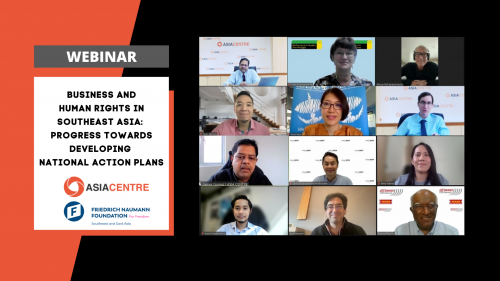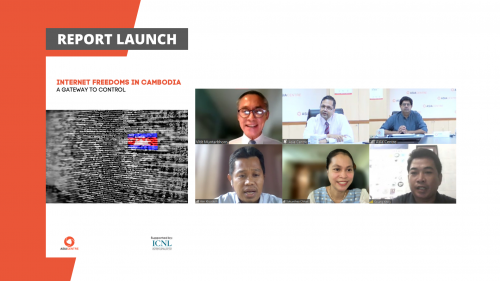China’s rise and its increasing assertive efforts to re-shape the world order have far-reaching consequences, in particular in Southeast Asia. In the age of information and disinformation, China’s ambitions as a global power must be appreciated critically, inclusive of the fact that Southeast Asia and the Association of Southeast Asian Nations (ASEAN) are means to an end – removing China’s sense of being ‘encircled’ by its global competitors, namely the United States and its allies.
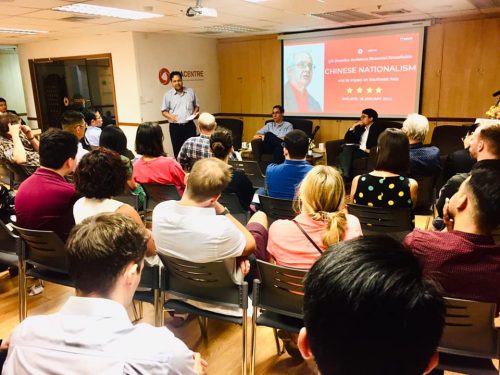
To dissect China’s foreign policy and its impact on the region, Asia Centre held its 4th Benedict Anderson Memorial Roundtable entitled “Chinese Nationalism and Its Impact on Southeast Asia” on 18 January 2019. Three experts were invited to present their perspectives on the topic, and analyzed the meaning of Chinese nationalism together with an audience of around 40 people. The Roundtable was moderated by Ms. Tessa Alleblas, Research & Grants Officer at Asia Centre.
Dr. Robin Ramcharan, Executive Director at Asia Centre, framed the discussion with reflections on the concept of nationalism, calling attention to fact and fiction surrounding Chinese nationalism in this age of information and disinformation. He linked this with China’s growth and rise as a global power and questioned how much of it is actually real or fake news, in terms of what we hear from China and what we hear about China.
Dr. Arm Tungnirun, faculty member at Faculty of Law, Chulalongkorn University, provided some observations on contemporary Chinese nationalism, which, like all nationalist movements, is imbued with a healthy dose of mythology. He argued that China’s nationalism is unique and distinct, and a constructed narrative. Dr. Arm Tungnirun highlighted four characteristics of Chinese nationalism: (1) China is moving towards greater technical sophistication and advancement for greater power in the global arena (“techno nationalism”), (2) Chinese nationalism is a tool used by the Communist Party to justify having a strong ruler leading the country (“Communist Party nationalism”), (3) Chinese nationalism with interventionist features shows China’s global ambition, and (4) Chinese nationalism and civilization is unique and distinct, and anti-Western.
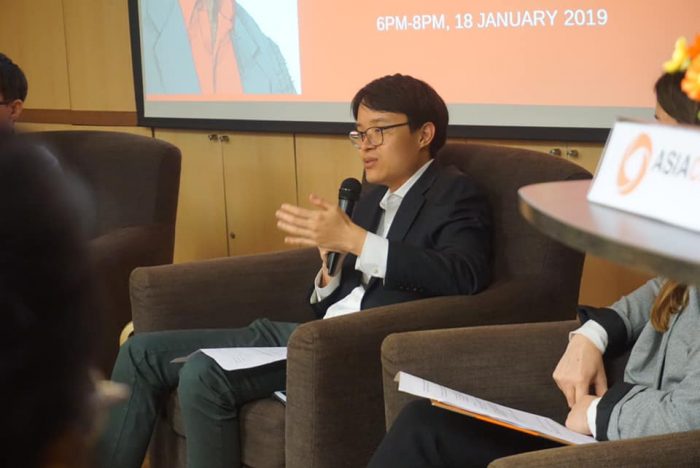

Dr. Harish Mehta, Editor-in-Chief, The Calcutta Journal of Global Affairs, discussed via Skype his research on the history of socialism with Chinese characteristics and the Chinese dream. He argued that Xi Jinping’s vision is of a China with global leadership ambitions, that will lead the world and will not play second fiddle. He noted that Chinese and many western scholars see the Communist party as the end of the imperial era. The Chinese believe that the Communist Party was successful because where there were villages in the past, now there are towns, and that there has been considerable decentralization of power at the local level.
Dr. Balazs Szanto, Lecturer in International Relations at Webster University, drawing on research about contemporary Chinese nationalism and PRC’s Senkaku/Diaoyu Islands claims, argued that nationalism in modern China, was generated in order to increase the legitimacy of the Communist Party. China’s foreign policy advances China’s nationalist narrative that seeks to justify its territorial pursuits in the region. Dr Balazs also argued that Xi Jinping is over-reliant on nationalism as a means to boost the legitimacy of his government.
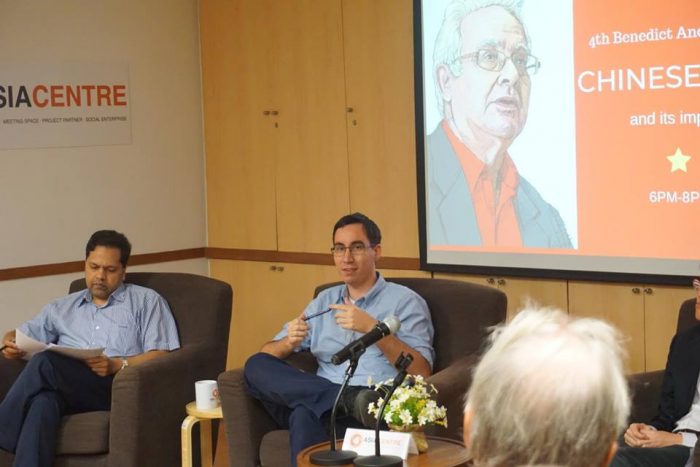
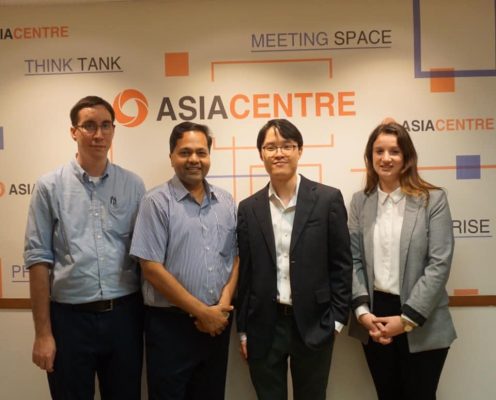
The ensuing panel discussion reflected on the origins of Chinese nationalism and the Chinese dream, the relevance of Marxism in discussions about nationalism, why countries in Southeast Asia cannot turn to the U.S. when addressing China’s assertive policy in the region, how China’s policies affect the Chinese diaspora in the region, Xi Jinping’s foreign policy “Belt and Road” (BRI) initiative. It was suggested that the BRI initiative is a useful overarching vision but devoid of real content and strategy. Southeast Asian countries must be cautious in light of the experiences of African countries experiencing the ‘Chinese debt trap’. Recent surveys on perceptions of China in Southeast Asia, as confirmed by the current Chinese Ambassador to Indonesia, revealed a serious trust deficit.
Asia Centre will continue to follow China and other emerging powers closely. Asia Centre hosts the annual Benedict Anderson Memorial Roundtable to honour the significance of the late professor’s contribution to studies of nationalism and South-East Asia, and to continue the debate around nationalism in its contemporary contexts. The inaugural Roundtable was held on 30 January 2016, with the theme Debating Imagined Communities: A Tribute To Benedict Anderson. The second Roundtable, held on 18 January 2017, centred on the topic Nationalism, Citizenship and Statelessness: Current Issues and Developments in Asia. The third Roundtable entitled Gender and Nationalism in Asia: from Scholarship to Leadership was held on 19 January 2018.
In you are interested in issues of nationalism or the work of Benedict Anderson, Asia Centre is inviting expressions of interest to co-host the next Benedict Anderson nationalism event. Please email: contact@asiacentre.org

